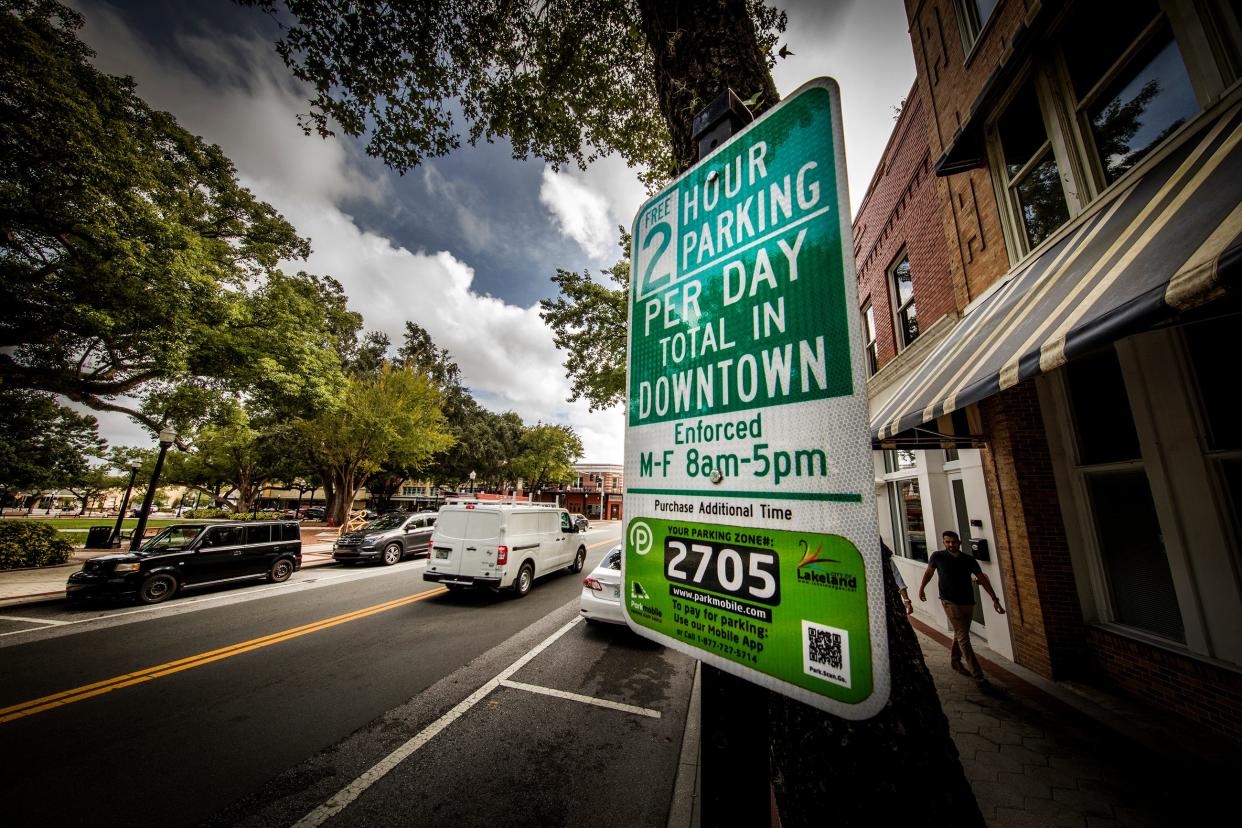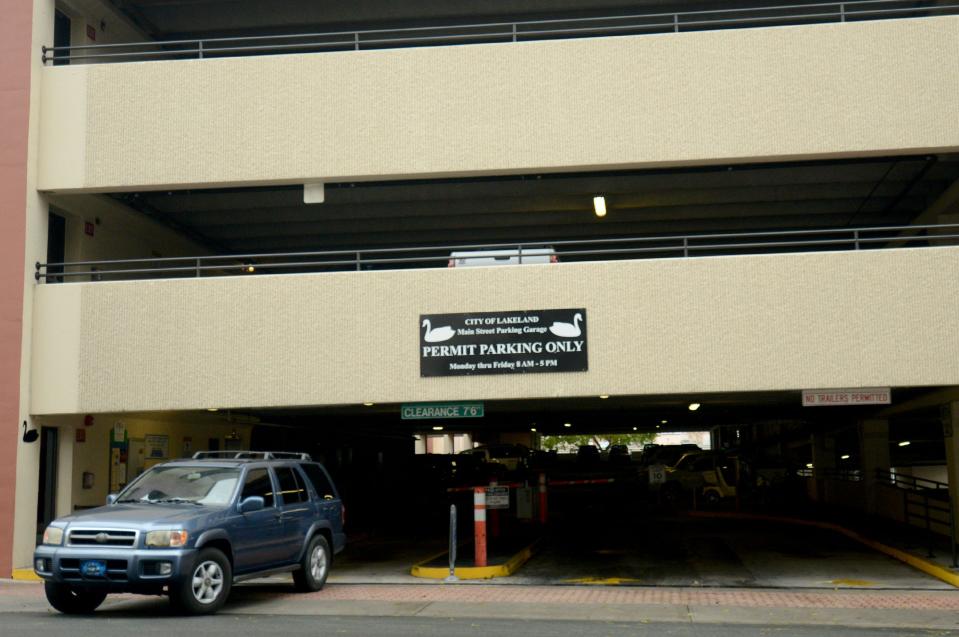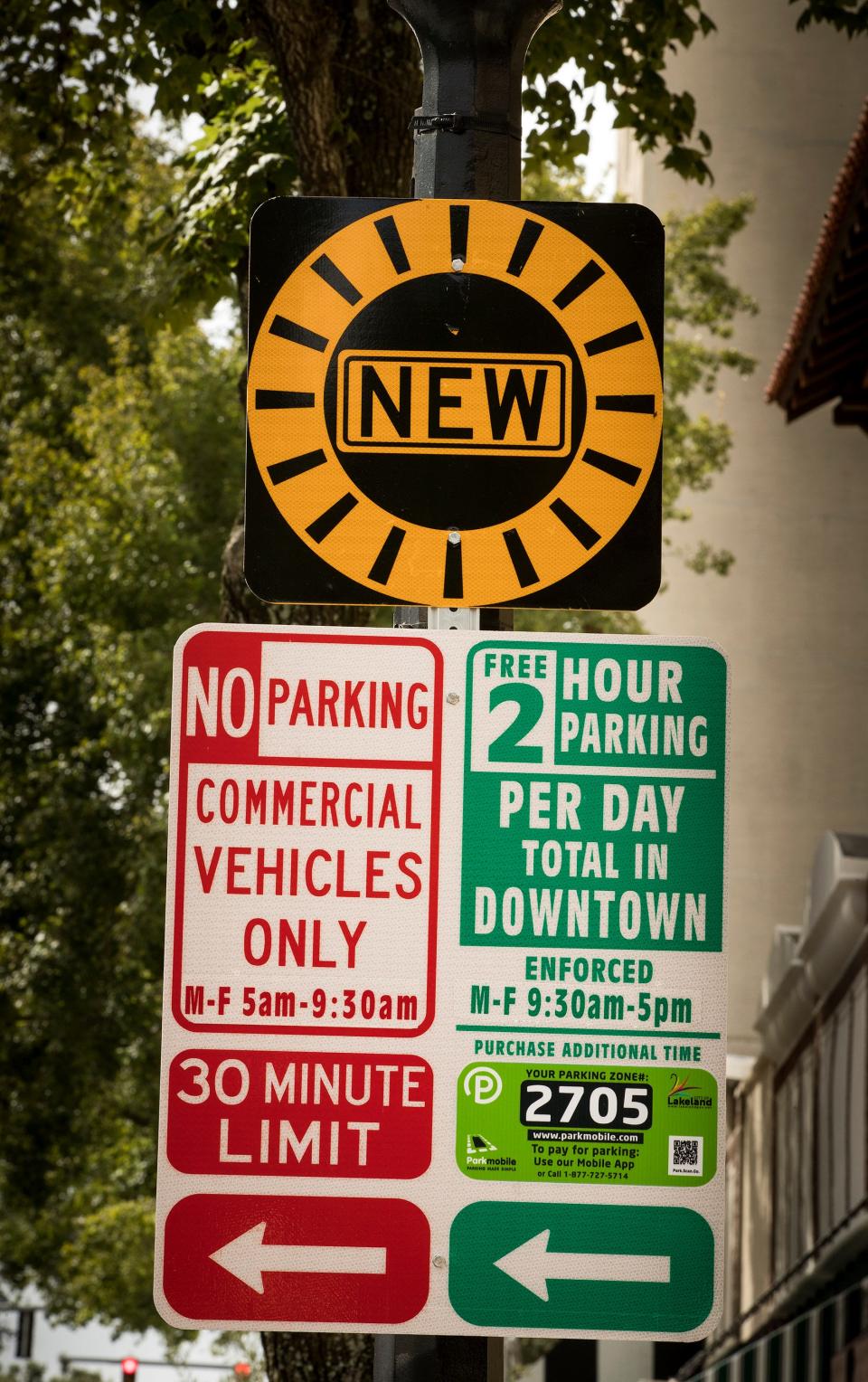No more free ride? Lakeland considers charging more for downtown parking

LAKELAND — Lakeland has plenty of parking downtown, according to a recent study, it's just a matter of making sure all the space is being used well.
But a plan being considered could hit drivers where it hurts: their wallets.
Lakeland commissioners were presented the findings of the Downtown Parking Assessment study performed by Lakeland-based consultants Kimley-Horn along with the city staff. It was started in August 2022 after years of debate and complaints about finding parking in downtown.
"We have to remember what we were. We were a city that was trying to bring people downtown, so we were trying to make it attractive to come downtown and make it free to park downtown for a period of time," Mayor Bill Mutz said. "Now we're going to have a lot of continuing pressure on parking where we want people to be able to park, but we want them to park where we want them to park."
Downtown Lakeland was defined in the study as an area with a northern boundary of George Jenkins Boulevard in the north and Louise Place in the south, and from Lake Avenue in the east to Sikes/Harden Boulevard in the west.
"Our existing parking supply can meet the projected demand over the next 10 years," said Tess Schwartz, the city's traffic operations manager. "Which is great news, because that means rather than looking at investing in building a new parking garage or infrastructure, we will be looking at how can we best manage our system to manage the parking spaces that we have."
Who goes downtown and where are they parking?
Most of the people coming to downtown are locals, and their reasons vary based on day of the week.
Schwartz said city staff worked with Kimley-Horn to collect data about who was coming downtown and why over a three-day period, from Nov. 3 to 5, 2022. The information was gathered during two-hour windows of lunch and dinner rushes.
It found there's 20,889 average daily trips to downtown on weekdays with nearly 30% of people coming downtown for work and nearly as many to shop. The majority, more than 60%, had traveled less than 15 minutes to reach the area.
Slightly fewer people travel downtown on the weekends, but more come to the area looking to shop, eat and enjoy recreational time, according to the study.
"We saw on-street parking demand exceeds supply particularly around Munn Park and on Kentucky Avenue, which I'm sure you can all see with your own two eyes," Schwartz said. "Parking lots and garages are used inefficiently."
Friday dinner and Saturday lunch hours see the highest demand for on-street parking, according to the study, with spots widely perceived to be near capacity or full.
Yet Schwartz said at these same times the city's parking garages aren't being used. The Iowa Avenue, Orange Street, Heritage and Summit's first-floor parking garage are all at or below 25% capacity. Only the Main Street Garage's occupancy is consistently above 50%, or "well utilized."
Dollars and sense: Changing where people park
To change how Lakelanders are parking, Schwartz said one of the top recommendations is for the city to create a parking rate structure that financially encourages long-term parking in the garages and surface lots. This would ideally keep on-street parking along Munn Park for quick pick-ups and short trips.
It's recommended the city charge $2 an hour to drivers who want to park on the streets around the center of Munn Park — Kentucky and Tennessee avenues and Main Street — for a maximum of two hours a day. Spaces a block or two away from Munn Park would have a reduced rate of $1 per hour for a maximum of four hours, or $4 total cost.
Mutz said he wouldn't place such a strict limit on how long a person can park on the street. If they wanted to be parked on-street for eight hours, let them pay $16.

This would eliminate the city's current practice of allowing cars to be parked on the street for up to two hours for free.
"I think businesses are going to be grumpy if we go to paid parking on the street, I still support it. I'll fight the good fight and advocate for that," said Julie Townsend, executive director of the Lakeland Downtown Development Agency. "I think the initial knee-jerk reaction is going to be, "You are going to kill my business.' I don't think that's true."
Townsend said she thinks it's still important to have some free parking somewhere. She suggested giving some amount of free time in the city's garages to further incentivize people to park there.
"To eliminate free parking makes me a little nervous for multiple reasons I won't necessarily go into," she said, without elaborating.
Lakeland's signage is 'word vomit'
The parking study found Lakeland's parking confusing, and that was one issue commissioners larger agreed on.
Commissioner Stephanie Madden said it boggles her mind how many of Lakeland's parking areas are shared by all types of different users. The city's signage, often called wayfinding, isn't always helpful.
"When people are driving, they can't read fine print. They can't read the sign," she said.
Jason Ehrlich, the city's parking services supervisor, was able to aptly describe the city's myriad parking signs succinctly.
"A lot of the signage we have downtown is word vomit," he said. "[At] Heritage Garage, when you drive by the only words you can read on that garage is 'No.'"
Madden recently brought up a situation in which a woman parked her car streetside downtown, met with people and left, then came back and parked in a different space. The woman was ticketed as there's no re-parking in downtown.
"We don't want that to be people's first time interacting with our system," Schwartz said. "We want it to be easy, we want them to understand the rates and where they can park."
Schwartz said drivers frequently pull into the Main Street garage only to panic about whether they can park there, make a U-turn and pull back out.

Ehrlich said the city needs to simplify its signage, make it more inviting and use "breadcrumbs." This is a method where the first sign provides one crucial detail to a driver, and the next sign provides additional information.
"I would rather see improvement on wayfinding and predictability before I start changing prices," Madden said. She did agree on raising parking rates, once the process is easier for residents and visitors to navigate.
Rates likely to rise at at parking garages
The cost to park at the city's garages is likely to increase as a result of the study. The recommendation, Schwartz said, is to keep the metered rate at $1 an hour, but raise the daily maximum charge from $2.50 up to $8.
"Lakeland's garages offer more free parking and lower rates" when compared with the cities of Gainesville, Sarasota, Tampa and West Palm Beach, she said.
The city's maintenance costs for the its parking garages, not including staffing or software, is roughly $260,000 a year, Schwartz said. She said the program is operating "a deficit" because it pulls around $200,000 from the city's Transportation Fund — designated to maintain and build new roads and sidewalks — each year.
From lawsuits to criminal charges: How a carport set a South Lakeland neighborhood at war
Lakeland collected about $890,000 in revenue through its city parking in the past 12 months, according to study. Schwartz said the majority of these funds are used to pay off the city's debt service for its share of constructing the Heritage Parking Garage.
"I think it's really important for us to create a more financially sustainable parking system," she said.
Monthly permit holders maybe not be exempt
Lakeland rents out many of the spots in its garages and surface lots to monthly permit holders, employees of downtown businesses who need reliable access to parking spaces. Rates vary from $25 to $95 a month depending on the location and whether the space is covered.
SunRail expansion: FDOT recommends seven stations in Polk County
The study recommends the city increase this to $70 a month, universally where possible. Some spaces are price-fixed under long-term contracts.
Mutz said he thinks based on his visits to other cities, including Boise, Idaho, the price should be even higher.
"Permits for $90 on a monthly basis, flat rate, as opposed to a changing rate seems a reasonable request moving forward," he said.
Madden and Mutz agreed that it could be beneficial moving forward to make one of the city's parking garages, possibly Main Street, solely designated for visitors. City staff was asked to figure out how that might be possible.
Calls to increase parking enforcement
It's also recommended that the commission increase the hours on parking limitations.
Currently, the city only enforces parking meters and time limitations from 9 a.m. to 5 p.m. on weekdays. On-street spaces and garages are free on weekday evenings and weekends.
"The timing of our enforcement doesn't match peak and demand," Schwartz said. "We enforce until 5 p.m. Our peak demand is after 5 p.m. and weekends."
This could mean longer metered hours across the city with significantly less or no free parking.
Schwartz said it's estimated the city would need to hire two additional staff members to enforce these parking limitations.
"They should pay for themselves," Mutz said.
What's next?
The city's Downtown Parking Assessment will be shared with interested public and private stakeholders this month, Schwartz said. Some of these shareholders include the LDDA, Lakeland Community Redevelopment Agency, Lakeland Economic Development Council, Lakeland Chamber of Commerce and the city's private partners in the Heritage Parking Garage, MidFlorida Credit Union, Lakeland Regional Health and others.
Schwartz said feedback from the commission and stakeholders will be incorporated into the study and its staff recommendations in December. It will result in a series of parking policy changes submitted for city officials to approve, likely in February.
Downtown Parking facts
8,595 total parking spaces in downtown.
City of Lakeland owns and operates roughly half the parking.
662 parking spaces are on the street.
7,933 spots are in garages, parking lots.
Highest demand for parking is Friday, from 6 p.m. to 8 p.m.
Parking Revenue: $890,289 in the past year.
Sara-Megan Walsh can be reached at swalsh@theledger.com or 863-802-7545. Follow on X @ SaraWalshFl.
This article originally appeared on The Ledger: Lakeland looks at changing parking fees and enforcement times downtown

